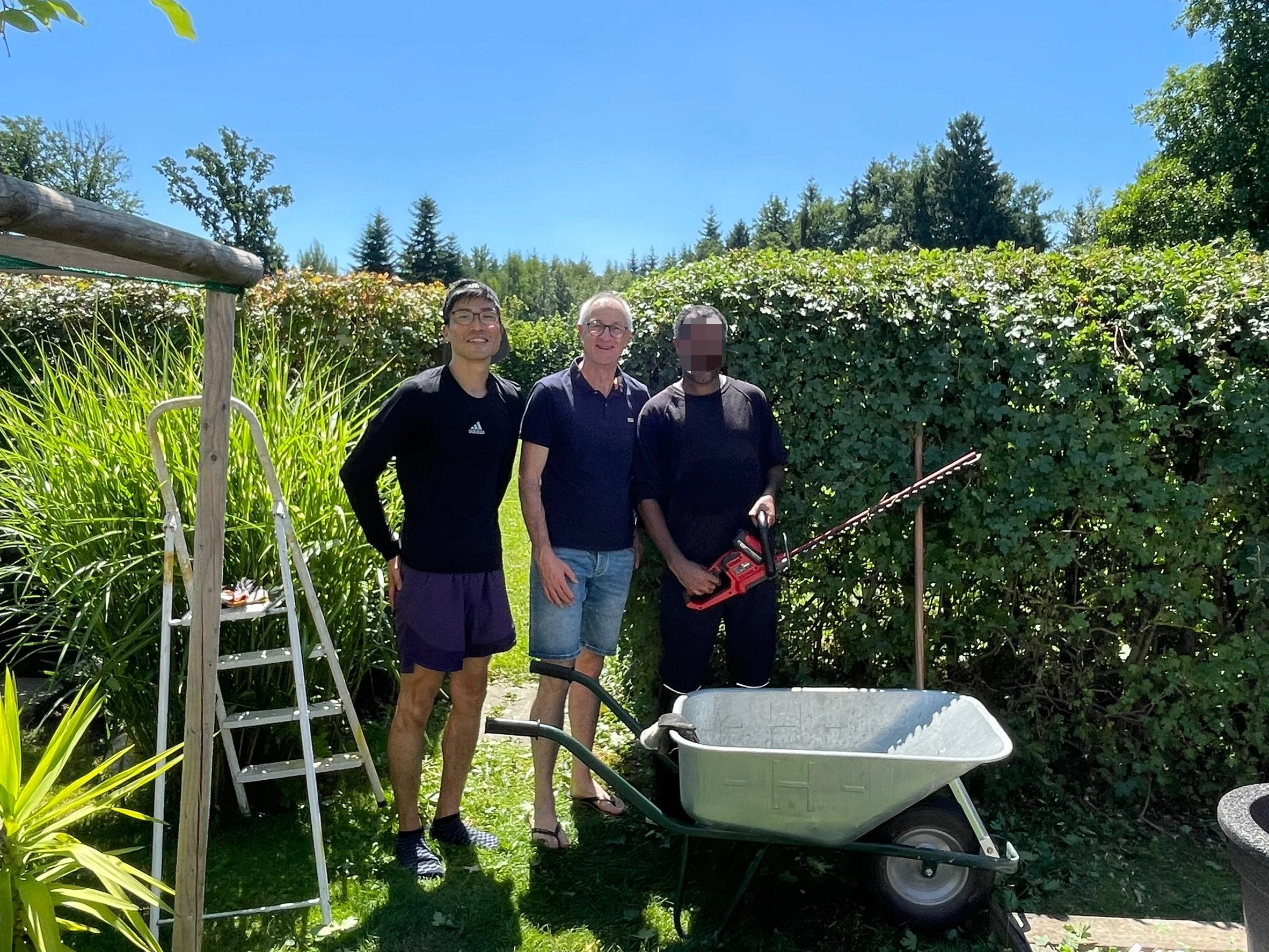Life is hard, but / 人生は厳しい、しかし
日本語は下へスクロールしてください。
The migration and refugee issue is often covered in the Japanese media these days, but in Europe it is becoming increasingly serious, incomparable to that of Japan. Helping refugees and migrants well-integrate into the Austrian society is part of our mission‘s work. (Being foreigners ourselves, my wife and I have been making efforts to integrate ourselves first, so our words wouldn’t be empty.)
In a new country with a different culture and language, integrating into local society is essential to leading a sustainable social life that benefits the self as well as the country. In terms of faith, I believe it is God's will that, after having left Islam and connected to the true God, one should interact and fellowship not only with compatriots, but also with believers from Austria and other countries, in order to live a healthy faith life. (John 17:13-23)
As part of our ministry, we take asylum seekers and refugees to local people's homes and provide services such as pruning garden trees, mowing lawns, chopping firewood, etc. We call it a help project, but I personally think it could be called a win-win project, as it benefits both the local people and the refugees.
When refugees receive a gift of thanks, it is paid through an official app called the Service Voucher (Dienstleistungsscheck), which sets them apart from the undeclared labor that is rampant in Europe and serves as good evidence during the interview for refugee status application. In case a worker gets injured while working, he or she will be covered by accident insurance, providing reassurance.
Recently I took an African asylum seeker, S. with me to the home of local Christians. We had joy and fun, working in their garden, pruning the trees. S. was well-educated and had a well-paid job in his home country, but due to ethnic conflicts and political reasons, his wife urged him to seek asylum in Europe in order to find a new path, even though it resulted in leaving his wife and children behind in Africa.
A delicious lunch was prepared for us and as we sat around the table, S seemed to ease and relax. Many refugees only associate with fellow refugees or people who speak the same native language, and have almost no contact with local people - S. was no exception. When I visited S. at the refugee house the following day, he was truly happy to have met such a kind Austrian married couple. But God's blessings did not end there.
I had invited S. to church a couple of times before, but he never got around to it. However, this time, S. personally got to know Gerhard and Martina who had asked him for the garden work, and they invited him to church. His first interview for refugee status application was scheduled for Tuesday and even though he was busy preparing for it, he came to the church service on Sunday, two days before the interview. Just before S. hit the road, with Gerhard‘s suggestion, he and I put our hands on S.'s shoulder and prayed for his interview. He thanked us many times and left for home.
In Austria, significant percentages of refugee applications are rejected during their first interview (you generally get two chances in total). Once again S. and I carefully reviewed the answers to the questions he would likely be asked during the interview, and then the day of the interview came. Gerhard and Martina kindly wrote a letter of recommendation for S., which he submitted along with two other letters and the necessary documents to the interviewer. Two weeks after the lengthy interview, I got a message on my phone; S. sent me a photo. Miraculously, his refugee status application has been approved! Now, free from the fear of deportation, S. can prepare to welcome his family to Austria and be reunited with the loved ones.
Now that his refugee application has been granted, S. must leave the refugee house within four months (now three more months to go). He is currently struggling to find work and a new apartment. S. would take any job offer, but the inability to speak German and, in his case especially, his high education and successful career seem to be working against him in his job search. He needs to find work quickly and buy plane tickets for his wife and children. This is because the law that prevents refugees from bringing their families to Austria from their home countries is likely to come into effect any time soon.
Meanwhile, when I visited S. yesterday, I heard the incomprehensible news. He'd received a call from Africa the day before that S.'s wife had been diagnosed with breast cancer. S. told me that he cried with his wife and various thoughts ran through his head all night. According to S., the difference in the medical system between Austria and his home country is like heaven and earth. The wife‘s medical certificate was full of technical terms and expressions, but based on our family's past experiences, I understood the urgency of the situation and that treatment is needed as soon as possible. S‘s wife is only 30 years old, and their children are 9 and 3. S. repeatedly sighed, "one hardship after another. Life is tough. Life is hard." I understand him very well. I told him for the first time that our family had also been through cancer treatment, and S. and I prayed to Jesus together. Life can sometimes bring cruel trials, but Jesus is always good and always there. The mountain to overcome is huge, but when I said to him, "Please put trust in Jesus and make God your top priority," S. seemed convinced. Even if life gets hard, Jesus' nature doesn’t change. God is good. Always and forever. Please remember S. in your prayer.
日本でも昨今メディアで取り上げられる移民・難民問題、ヨーロッパでは日本のそれとは比べものにならないぐらい深刻さを極めています。難民・移民のインテグレーション(現地社会への融合)を手助けすることは、私たちの宣教活動の一端です。(口先だけとならないよう、自身も外国人の私たち夫婦は、まず自分たちが現地にインテグレーションしようと努めています。)
文化も言語も違う新たな国で、自分自身と国のためになるサステイナブル(持続可能)な社会生活を送るためには、現地社会への融合が不可欠です。信仰面で言えば、イスラム教を離れて、唯一まことの神に繋がり、健全な信仰生活を送るためには、同胞とだけではなく、現地オーストリアや他国のクリスチャンと交流を持つことは神の御心だと思うのです。(ヨハネ17:13-23)
ミニストリーの一環で、亡命希望者や難民を連れて、現地の人の家におもむき、庭木の剪定、芝刈り、薪割りなどのサービスを提供しています。ヘルプ・プロジェクトと言いますが、現地の方にとっても難民の方にとってもメリットがあるので、Win Winプロジェクトと呼んでもいいじゃないかなと個人的には思っています。
難民が謝礼を受け取る際は、サービスバウチャー(Dienstleistungsscheck)という公的なアプリを通して支払われることで、欧州で横行する無申告の労働と一線を引き、難民認定申請の審査面談の際にも良い証となります。活動中に万が一怪我した場合にも傷害保険が適用され、安心も担保できます。
今回、アフリカ人亡命希望者Sさんとともに現地クリスチャンのお宅で庭木の剪定作業を行いました。Sさんは自国で優秀な人材で、良い仕事に就いていましたが、民族間の紛争、政治的な理由から、妻に背中を押され、ヨーロッパまで新たな活路を見出すために亡命してきたのです。自国に妻子を残してまでもです。
昼食に依頼者の方が美味しい食事を作ってくれ、テーブルを囲いながら、Sさんの緊張もほぐれてきます。難民の多くが、同胞や同母語の人とだけ連み、現地人と交流はほとんど皆無、Sさんも例外ではありません。後日、難民ハウスまでSさんを訪問すると、親切なオーストリア人と出会えたことを心から喜んでいました。そして、神の祝福はそこで終わりませんでした。
僕は以前Sさんを何度か教会に誘いましたが、彼の重い腰が上がることはありませんでした。しかし今回、庭木の剪定を依頼したギャーハートさんと奥さんのマルティーナさんと親しくなり、ご夫妻がSさんを教会に誘ってくれたのです。すると、翌々日に難民認定申請第1回目の面談を控えており、その準備に追われているにもかかわらず、礼拝に来てくれました。ギャーハートさんの提案で、Sさんの肩に手を置き、火曜日の面談のために祈ると、彼は何度も感謝し、感無量のおもむきで帰路につきました。
オーストリアでは、難民認定申請1回目の面談は、かなりの割合が却下されます。(基本的に全部で2回チャンスがあります。)面談で問われるであろう問いの回答を、最後にSさんと僕でもう一度一緒に精査し、面談当日を迎えました。ギャーハートさんとマルティーナさんが推薦状を書いてくれ、他2枚の推薦状と必要書類と併せて、面接官に提出しました。長時間の面談から2週間後、携帯のメッセージ受信のベルがなり、Sさんから一枚の写真が送られてきました。なんと、奇跡的に難民申請が通ったのです!これで強制送還の恐れから解放され、自国に残してきた家族をオーストリアに迎える準備ができます。
晴れて難民申請が通ったので、今いる難民ハウスを4ヶ月以内(あと3ヶ月)に出ないといけません。現在は苦戦している仕事探しと住まい探しに奮闘しています。どんな仕事でも良いのですが、ドイツ語が話せないことと、彼の場合は特に高学歴と優秀なキャリアが仇のようです。早く仕事に就き、妻と子どもたちの航空券を購入しなければいけません。というのも、難民が自国の家族をオーストリアへ呼べなくなるという法律が現在すぐにでも施行されそうな状況だからです。
そんな中、昨日彼を訪問すると、信じられない事態を知らされました。一昨日アフリカから一報あり、Sさんの奥さんが乳がんの診断を受けたというのです。電話口で号泣する奥さんと涙を流し、夜通し色んな思いが頭を駆け巡ったそうです。Sさん曰く、オーストリアの医療と彼の国のそれとでは天と地の差。診断書を見せてもらうと専門用語や表現だらけでしたが、僕ら家族の過去の経験から、早期治療が必要なことはよく理解できました。奥さんはまだ30歳、子どもは9歳と3歳。「一難去ってまた一難。人生は厳しい。人生は辛い」と何度もため息をつくSさん。 彼の心境はよくわかります。僕ら家族もがん治療を経験したことを彼に初めて伝え、一緒にイエスさまに祈りました。人生は時に無情にも試練を与えますが、イエスさまはいつも良いお方。乗り越えないといけない山は大きいですが、「イエスを信じ、最優先順位を神に設定してください」と伝えると、Sさんも納得したようでした。人生は時に厳しくとも、イエスさまのご性質は変わりません。神は良いお方。いつも、いつまでも。どうぞお祈りに覚えてください。

